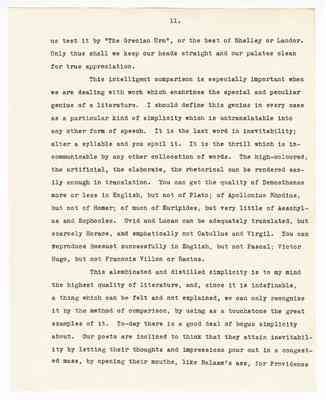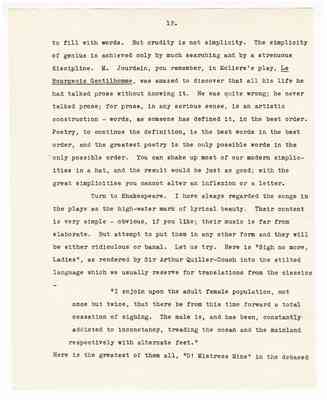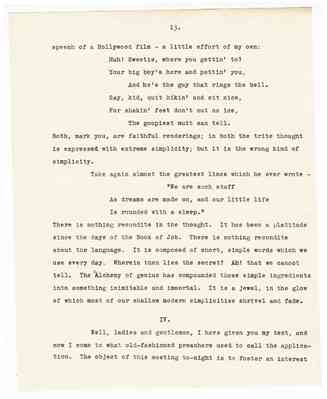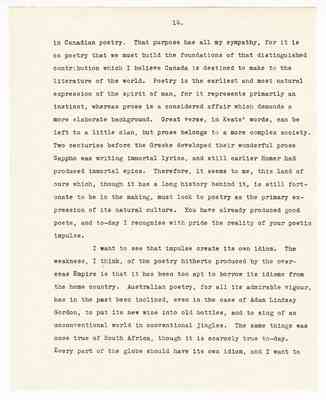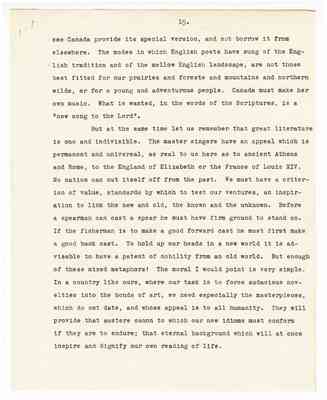Pages
page_0011
11.
us test it by "The Grecian Urn", or the best of Shelley or Landor. Only thus shall we keep our heads straight and our palates clean for true appreciation.
This intelligent comparison is especially important when we are dealing with work which enshrines the special and peculiar genius of a literature. I should define this genius in every case as a particular kind of simplicity which is untranslatable into any other form of speech. It is the last word in inevitability; alter a syllable and you spoil it. It is the thrill which is incommunicable by any other collocation of words. The high-coloured, the artificial, the elaborate, the rhetorical can be rendered easily enough in translation. You can get the quality of Demosthenes more or less in English, but not of Plato; of Apollonius Rhodius, but not of Homer; of much of Euripides, but very little of Aeschylus and Sophocles. Ovid and Lucan can be adequately translated, but scarcely Horace, and emphatically not Catullus and Virgil. You can reproduce Bossuet successfully in English, but not Pascal; Victor Hugo, but not Francois Villon or Racine.
This alembicated and distilled simplicity is to my mind the highest quality of literature, and, since it is indefinable, a thing which can be felt and not explained, we can only recognise it by the method of comparison, by using as a touchstone the great examples of it. Today there is a good deal of bogus simplicity about. Our poets are inclined to think that they attain inevitabilability by letting their thoughts and impressions pour out in a congested mass, by opening their mouths, like Balaam's ass, for Providence
page_0012
12.
to fill with words. But crudity is not simplicity. The simplicity of genius is achieved only by much searching and by a strenuous discipline. M. Jourdain, you remember, in Moliere's play, Le Bourgeois Gentilhomme, was amazed to discover that all his life he had talked prose without knowing it. He was quite wrong; he never talked prose; for prose, in any serious sense, is an artistic construction - words, as someone has defined it, in the best order. Poetry, to continue the definition, is the best words in the best order, and the greatest poetry is the only possible words in the only possible order. You can shake up most of our modern simplicities in a hat, and the result would be just as good; with the great simplicities you cannot alter an inflexion or a letter.
Turn to Shakespeare. I have always regarded the songs in the plays as the high-water mark of lyrical beauty. Their content is very simple - obvious, if you like; their music is far from elaborate. But attempt to put them in any other form and they will be either ridiculous or banal. Let us try. Here is "Sigh no more, Ladies", as rendered by Sir Arthur Quiller-Couch into the stilted language which we usually reserve for translations from the classics
"I enjoin upon the adult female population, not once but twice, that there be from this time forward a total cessation of sighing. The male is, and has been, constantly addicted to inconstancy, treading the ocean and the mainland respectively with alternate feet."
Here is the greatest of them all, "0! Mistress Mine" in the debased
page_0013
13.
speech of a Hollywood film - a little effort of my own:
Huh! Sweetie, where you gettin' to? Your big boy's here and pettin' you, And he's the guy that rings the bell. Say, kid, quit hikin' and sit nice, For shakin' feet don't cut no ice, The goopiest mutt can tell.
Both, mark you, are faithful renderings; in both the trite thought is expressed with extreme simplicity; but it is the wrong kind of simplicity.
Take again almost the greatest lines which he ever wrote
"We are such stuff As dreams are made on, and our little life Is rounded with a sleep."
There is nothing recondite in the thought. It has been a platitude since the days of the Book of Job. There is nothing recondite about the language. It is composed of short, simple words which we use every day. Wherein then lies the secret? Ah! that we cannot tell. The alchemy of genius has compounded those simple ingredients into something inimitable and immortal. It is a jewel, in the glow of which most of our shallow modern simplicities shrivel and fade.
IV.
Well, ladies and gentlemen, I have given you my text, and now I come to what old-fashioned preachers used to call the application. The object of this meeting tonight is to foster an interest
page_0014
14.
in Canadian poetry. That purpose has all my sympathy, for it is on poetry that we must build the foundations of that distinguished contribution which I believe Canada is destined to make to the literature of the world. Poetry is the earliest and most natural expression of the spirit of man, for it represents primarily an instinct, whereas prose is a considered affair which demands a more elaborate background. Great verse, in Keats' words, can be left to a little clan, but prose belongs to a more complex society. Two centuries before the Greeks developed their wonderful prose Sappho was writing immortal lyrics, and still earlier Homer had produced immortal epics. Therefore, it seems to me, this land of ours which, though it has a long history behind it, is still fortunate to be in the making, must look to poetry as the primary expression of its natural culture. You have already produced good poets, and today I recognise with pride the reality of your poetic impulse.
I want to see that impulse create its own idiom. The weakness, I think, of the poetry hitherto produced by the overseas Empire is that it has been too apt to borrow its idioms from the home country. Australian poetry, for all its admirable vigour, has in the past been inclined, even in, the case of Adam Lindsay Gordon, to put its new wine into old bottles, and to sing of an unconventional world in conventional jingles. The same things was once true of South Africa, though it is scarcely true today. Every part of the globe should have its own idiom, and I want to
page_0015
15.
see Canada provide its apecial version, and not borrow it from elsewhere. The modes in which English poets have sung of the English tradition and of the mellow English landscape, are not those best fitted for our prairies and forests and mountains and northern wilds, or for a young and adventurous people. Canada must make her own music. What is wanted, in the words of the Scriptures, is a "new song to the Lord".
But at the same time let us remember that great literature is one and indivisible. The master singers have an appeal which is permanent and universal, as real to us here as to ancient Athens and Rome, to the England of Elizabeth or the France of Louis XIV. No nation can cut itself off from the past. We must have a criterion of value, standards by which to test our ventures, an inspiration to link the new and old, the known and the unknown. Before spearman can cast a spear he must have firm ground to stand on. If the fisherman is to make a good forward cast he must first make a good back cast. To hold up our heads in a new world it is advisable to have a patent of nobility from an old world. But enough of these mixed metaphors! The moral I would point is very simple. In a country like ours, where our task is to force audacious novelties into the bonds of art, we need especially the masterpieces, which do not date, and whose appeal is to all humanity. They will provide that austere canon to which our new idioms must conform if they are to endure; that eternal background which will at once inspire and dignify our own reading of life.
